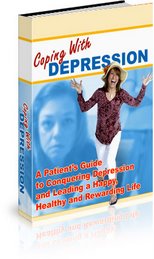Faye B. Roberts
Depression in children is different from the normal "blues" and usual emotions that happens as a child develops. Just because a child seems depressed or sad does not necessarily mean they have childhood depression. But if these symptoms become ongoing, disruptive, and interfere with daily social activities, their schoolwork and their home life, it may indicate that he or she has a medical illness called depression. Keep in mind that while depression in children is a serious illness, it is also treatable.
Because they are often passed off as normal growing pains, the emotional and psychological changes that occur for a child who is depressed are often left undiagnosed and therefore untreated. The symptoms in children are very similar to the symptoms for an adult in that they will display sadness, a feeling of hopelessness, and mood changes.
Some of the symptoms and behaviors linked with depression in children include:
* Irritability, crying, feeling sad, helpless or hopeless
* Continuous feelings of worthlessness
* Loss of interest or pleasure in social activities
* Fatigue and loss of energy nearly every day
* Fearful, tense, anxious
* Repeated rejection by other children
* A drop in school performance
* Inability to sit still, fidgeting or pacing, difficulty concentrating
* Repeated vocal outbursts, shouting or complaining
* Doesn't interact with other children
* Repeated physical complaints without medical cause (headaches, stomach aches)
* Significant change in appetite (not due to appropriate dieting)
* Change in sleep patterns
There are also some serious and critical symptoms associated with depression in children. Medical intervention is imperative if a child displays any of these symptoms.
* Suicidal thoughts, feelings or self-harming behavior
* Abuse or prolonged use of alcohol or other drugs
As difficult as it may be to accept, studies show that children as young as 6 years old use street drugs. The use of drugs and alcohol among children is known to create depression. Drugs can cause mood swings, but on the other hand, someone with depression or mania may use drugs to take away the pain of uncontrollable mood changes. Determining if drugs or alcohol plays a part in a child's depression often requires some expert detective work. Parents need to be objective and discover if indeed that is part of the situation and be prepared to delve into all possibilities.
The correct diagnosis of depression is complicated and a mental health practitioner should be consulted. Working with your doctor you can come to a consensus as to the proper treatment for the child. Depression in children is treatable. Noticing any unusual symptoms is the first step. Getting help is the second one.
-----------------------------------------------------------------------------
Faye B. Roberts is an independent researcher and author on depression and is assisting others in their quest to understand this serious illness. Discover a new way of thinking and coping with depression that will change the way you look, feel and live your life. Visit Facts On Depression
Monday, June 11, 2007
Subscribe to:
Post Comments (Atom)



No comments:
Post a Comment